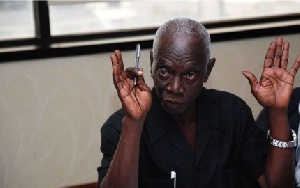The Chairman of the Electoral Commission (EC), Dr. Kwadwo Afari-Gyan on Thursday May 30, 2013, told the Supreme Court in the election petition trial that there were close to 80, 000 voters who were designated as ‘Face-Only’ (FO) voters because the biometric registration machines failed to capture their finger prints during the registration exercise.
He disputed claims by the petitioners’ key witness, Dr. Mahamudu Bawumia, who had said in his evidence-in-chief that there were only about 3,200 registered voters who were marked as FOs and thus could vote without biometric verification.
Explaining himself further in Court on Thursday, at the start of his evidence-in-chief for the second respondent, Dr. Afari Gyan said among those classified as FO voters were eligible voters who had suffered “permanent trauma” and “temporary trauma”.
He explained permanent trauma to mean voters who had no fingers at all for which reason their fingerprints could not have been captured by the biometric verification machine.
Temporary trauma sufferers, according to Dr. Afari-Gyan, were those who had fingers alright, but nonetheless did not have fingerprints to have been captured by the machine.
He said those two categories of voters were captured in the register as people who could only be identified by their faces before voting since their fingerprints could not be captured by the biometric verification equipment.
Lead Counsel for the petitioners, Mr. Philip Addison, raised an objection to further questioning on the FO category of voters by Lead Counsel for the Electoral Commission, Mr. Quashie-Idun.
Mr. Addison argued that issues related to the FO category of registered voters were not pleaded by the second respondent in its affidavits.
After re-phrasing his question to solicit a response to contradict Dr. Bawumia’s assertions in Court that only 3,196 people were registered as FOs, Dr. Afari-Gyan said: "I don't know where he got that figure from".
He clarified that: “The figure is well over 70,951”, adding that: “An earlier figure was given which is lower than this [but] the new figure had gone up by 62 following the registration of people in the Kassena Nankana District”.
“Even one region with the lowest number of FOs will be more than 3000”, Dr. Afari-Gyan asserted.
General News of Thursday, 30 May 2013
Source: radioxyzonline













